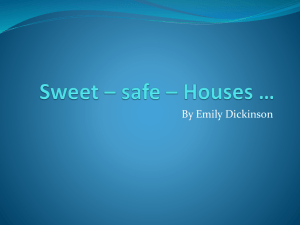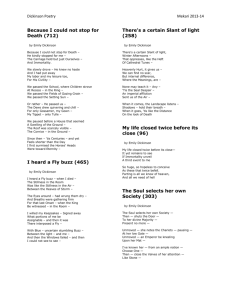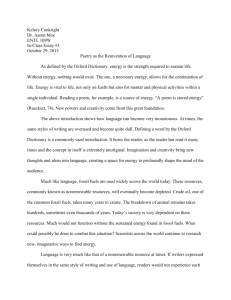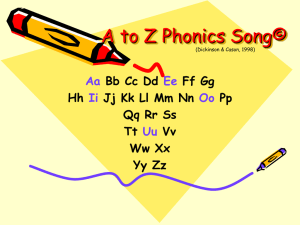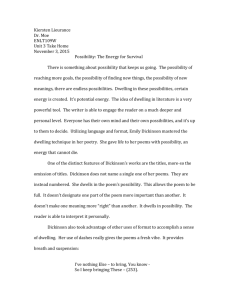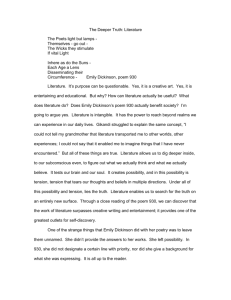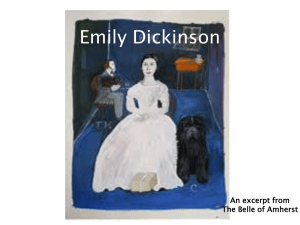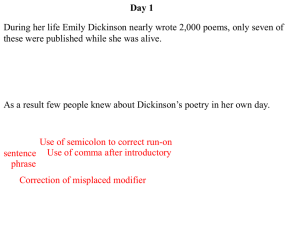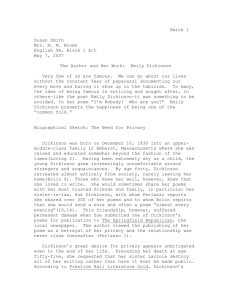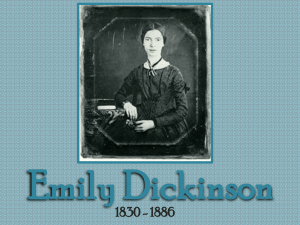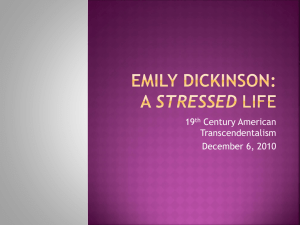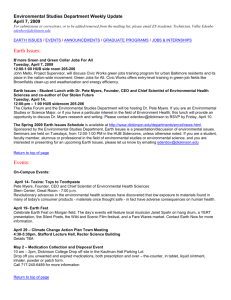Wild Nights by Emily Dickinson
advertisement
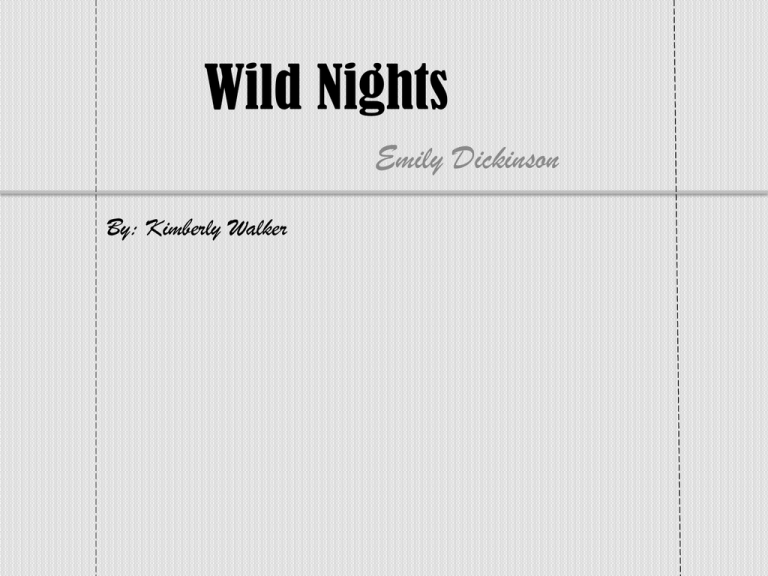
Wild Nights Emily Dickinson By: Kimberly Walker Wild Nights! Wild Nights! Were I with thee, Wild Nights should be Our luxury! Futile the winds To a heart in port, -Done with the compass, Done with the chart! Rowing in Eden! Ah! the sea! Might I but moor To-night in Thee! Rhyme Scheme: abbb cded fbgb "Wild nights! Wild nights!" is a poem of passion and rapture. Colonel Higginson wrote “One poem only I dread a little to print--that wonderful 'Wild Nights,'--lest the malignant read into it more than that virgin recluse ever dreamed of putting there. Has Miss Lavinia [Emily Dickinson's sister] any shrinking about it? You will understand & pardon my solicitude. Yet what a loss to omit it! Indeed it is not to be omitted.” Colonel Higginson says: Dickinson is undoubtedly using "luxury" in a meaning used in past languages as: lust, voluptuousness in the gratification of appetite. The "heart in port" is the lover's embrace. Yielding themselves to intimacy, they have no need for compass or chart, which are used to get to a specific destination and are instruments of control and reason. The sea is a common image for passion; think of the romantic movies you've seen with the waves crashing or the famous scene with the lovers in the waves in From Here to Eternity. Miller, Ruth says: The primary contrasts in the poem are between port and the sea (about which cluster ideas of wildness, darkness, winds, danger, and motion). These contrasts prepare us to find two different hearts: 1. is secure and has no need of compass and chart 2. requires danger. When we come to the final line, where the speaker expresses a desire to moor in "Thee," the contrasts, and how we feel about them, determine which heart we see and where we think it desires to be moored. Most readers take "Thee" to be the beloved. A few see the pronoun as ambiguous and conclude that sea and beloved are synonymous. A third possibility is that "Thee" refers only to the sea. Emily Dickinson was born December 10, 1830, in a town called Amherst, Massachusetts. Emily Dickinson never once moved away from her home town and lived her last years there. Emily died on May 15, 1886. Her poems were found after her death by her sister, Lavinia Dickinson, only two of her poems were published in her lifetime. Some people say Emily’s inspiration for her love poems came from a guy named Reverend Charles Wadsworth, who she had met in Philadelphia in 1854. On the other hand not much is known about Emily’s personal life Inspiration A lot of Emily Dickinson’s poetry was inspired by the bible. Her family was big in church and belonged to the Congregational Church, though Emily herself never became a member. Also sources say that Harriet Beecher Stowe was an inspiration in her poetry. Dickinson is considered a premier American poet. Dickinson wrote on a variety of subjects, including nature, love, death, and immortality. As she honed the lyric format, Dickinson developed a unique style, characterized by compressed expression, and an exploration of the possibilities of language. In 1995 Thomas H. Johnson Edition of Dickinson’s complete poems prompted renewed interest in her work. Modern criticism has focused on Dickinson’s style, structure, use of language, and her many different themes found in her poems. Regardless of who the critic is, most modern scholars incorporate some discussion of Dickinson’s life experiences into their examinations of her work. Google http://www.biographyonline.net/poets/emily_dickinson.html http://mith.umd.edu//WomensStudies/ReadingRoom/Poetry/Dickinson/ http://www.google.com/search?q=emily+dickinson&hl=en&rlz=1R2ADSA_enUS478&prmd=i mvnsoab&tbm=isch&tbo=u&source=univ&sa=X&ei=2WKyTHuD4im8ATQmbCBCQ&sqi=2&ved=0CIMBELAE&biw=1024&bih=540 http://academic.brooklyn.cuny.edu/english/melani/cs6/wild.html http://www.poetryfoundation.org/poem/173343 http://www.cswnet.com/~erin/ed8.htm http://savannah-schroll-guz.suite101.com/understanding-emily-dickinsons-wild-nightsa99747
